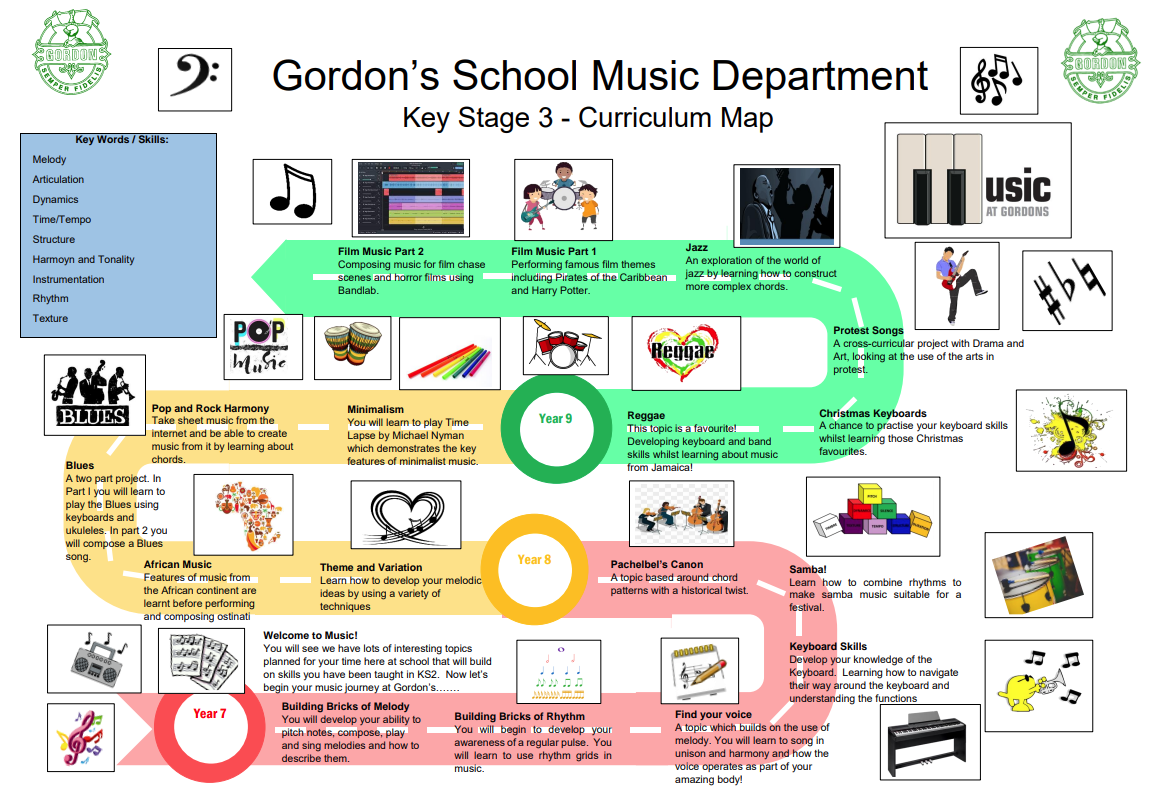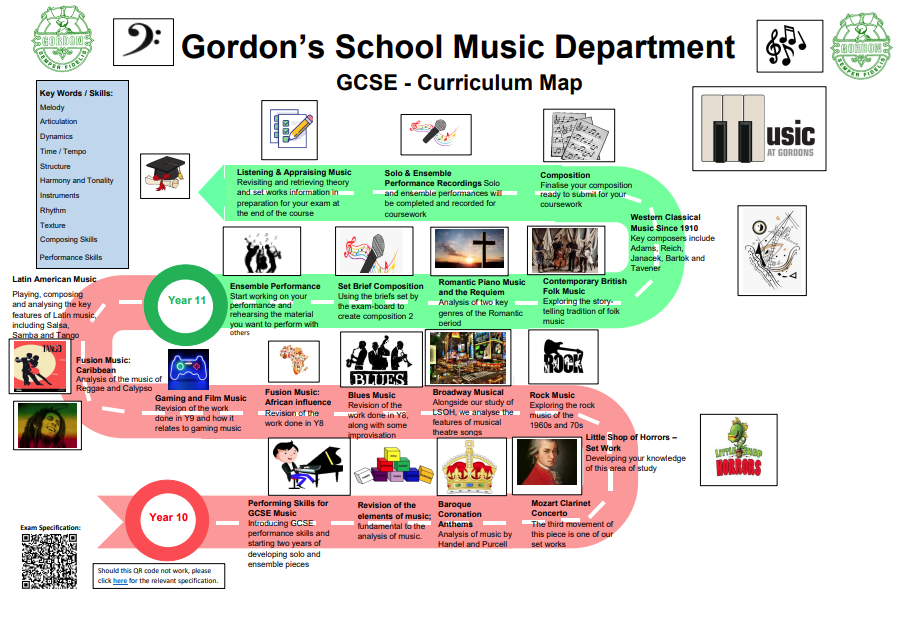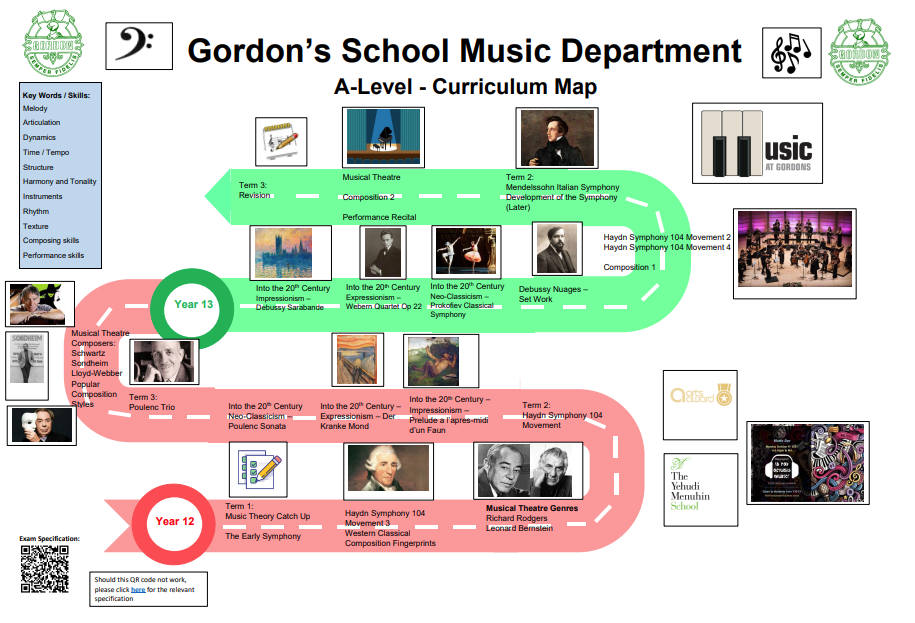Music

Summary
Music is available for all students at Key Stage 3, and as an option at GCSE and A Level. In addition to the curriculum music lessons, the department also runs a very busy co-curricular programme of activities and events and a Music Society for students in Year 10-13. A plethora of instrumental lessons run throughout the week delivered by a committed team of visiting instrumental staff.
At Key Stage 3, students cover a wide range of styles and periods, including Blues, Samba drumming and Pop Song writing. We also teach a cross-curricular project based on Music and Conflict. Students have access to a range of instruments to use in the curriculum, with projects based around ukulele work, keyboards and band instruments such as electric guitar and bass guitar. We are fortunate to have a suite of Macbooks and KS3 students use Garageband in a number of projects.
In terms of skills development, the following is a basic guide to how we structure the development of the three main strands of learning:
Performance (primarily looking at keyboard skills)
Year 7 – Perform short melodies accurately; have an emerging awareness of others when playing in a group
Year 8 – Perform melodies which are longer or more complex rhythmically; be able to play confidently in a duet situation, and in a larger group
Year 9 – To add simple left hand parts to performances, to be able to hold their own part in a larger group
Composition
Year 7 – to have an awareness of different types of compositional device and to be able to demonstrate them in their own work
Year 8 – to incorporate appropriate harmonic choices into composition
Year 9 – to use compositional devices to suggest time, place or mood
Musical Literacy
Year 7 – to understand the key musical element terms and be able to apply some to music they hear; able to read notes on the treble stave
Year 8 – to identify and describe musical elements and use appropriate musical language and an understanding of how a composer’s purpose and intention is reflected in the use of musical elements; growing confidence with reading treble clef notation including ledger lines
Year 9 – to confidently identify and describe musical elements and use effective musical language; able to read treble clef confidently and an emerging confidence with bass clef notation.
Head of Department: Mrs Brazendale rbrazendale@gordons.school

Summary
GCSE Music at Key Stage 4 (AQA Syllabus) offers helps students to develop subject knowledge, understanding and skills, through listening to a variety of music, playing music and creating their own music. The specification places a strong weighting on practical aspects of music with choices catering for a wide range of interests and abilities. The three-unit GCSE assesses students' skills in listening and appraising, composing and performing music.
GCSE Music a solid foundation for progression to other music studies, including A-level Music, and often to a music-related career. Our course provides the opportunity for students to develop valuable transferable skills such as self-confidence, concentration, creativity, evaluation and team work. We are delighted to have received the ISM Gold Medal for the last two years in recognition of over 20% of the Key Stage 4 group taking GCSE Music.
Course details
The GCSE Music course is designed to actively engage pupils in the process of music making; to allow pupils to develop as effective and independent learners and as critical and reflective thinkers with enquiring minds. Pupils will develop their own musical interests and skills and will enjoy performing individually and in groups. They will learn to understand and appreciate a range of different kinds of music. It is strongly advised that pupils taking GCSE Music have individual instrumental lessons and there is an expectation that they will want to be heavily involved in Music throughout the school.
TYPICAL ACTIVITIES
- Performing individually and in groups on a variety of projects.
- Listening analytically to music.
- Individual composition in a range of styles.

Summary
AS and A level Music at Key Stage 5 (Eduqas Syllabus) is designed to allow students to pursue their own musical interests. Students develop skills in the three distinct but related disciplines of performing, composing and appraising, whilst having flexibility to specialise in either performing or composing.
The Eduqas specification is designed to offer contrast and breadth as well as depth of study. Students will engage with both classical and popular music. All students will study the development of the symphony, engaging with landmark orchestral repertoire, which is important in developing knowledge and understanding of musical elements and language in context. Learners will use the musical language of this period to compose one piece of music to a brief. Students will also choose one area of study from Pop and Rock, Musical Theatre and Jazz and one further area of study exploring the musical language and styles from either the early twentieth century or the late twentieth and early twenty-first centuries.
Course details
Unit 1: Performance: Students are required to give a performance consisting of a minimum of two pieces either as a soloist or as part of an ensemble or a combination of both. One piece must reflect the musical characteristics of an area of study. The duration of the performance will be between 6 and 8 minutes and will be marked by a visiting examiner
Year 13 performance increases to 10-12 minutes with Grade 6 as the standard level.
Unit 2: Composition: For this unit students are required to prepare a portfolio of two compositions:
A composition which reflects the musical language, techniques and conventions associated with Western Classical Music in response to a brief set by the exam board.
A free composition for which students set their own brief.
Year 13 students can take either a 35% composition path (three compositions) or a 25% composition path (two compositions). It is possible to reuse AS work.
Unit 3: Appraising: This unit is assessed through a written exam which will assess knowledge and understanding of music through two areas of study. Area of study A is the Western Classical Tradition and the second area of study will be Musical Theatre. This unit also includes an in-depth study of Haydn Symphony 104, movements 1 and 2
Entry Criteria
GCSE grade 6 Music plus minimum grade 5 instrument




